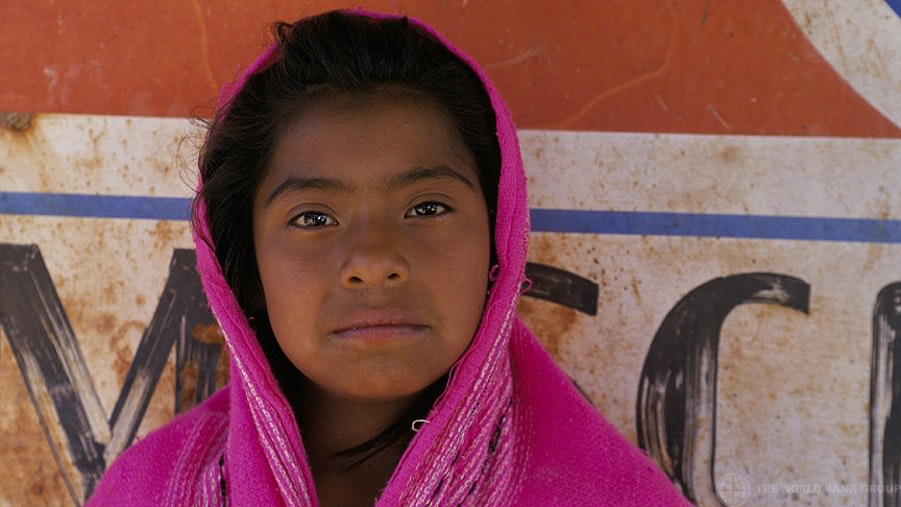INFORMAL CHILD MARRIAGES IN MEXICO: FINDINGS FROM NEW INSAD REPORT
June 23, 2017

When we think about child marriage we might think of South Asia or Sub-Saharan Africa. New research by the Ford Foundation and Investigación en Salud y Demografía (INSAD) brings Mexico – a country with the 8th highest number of child brides in the world – into the spotlight.
“Studies like these are enormously useful because they provide concrete evidence that this really is a problem in the Americas as well” Hillary Anderson, The Inter-American Commission of Women
The study is based on data from the 2015 intercensal survey, as well as interviews with 17 girls and 15 community actors and experts. We recap some of the key findings.
CHILD MARRIAGE IS NOT DECREASING IN MEXICO
Child marriage is common in many areas of Mexico. Nearly 1 in 4 girls (or 23%) are married or in a union before the age of 18, a rate that has been stagnant for almost 30 years. Living in rural area is a risk factor. In 14 of the 32 states, the report found that 30% of girls in rural settings were married before 18.
Rates vary across regions and states with girls in rural areas, where up to 30% of girls are married before 18, being most at risk.
UNIONS ARE COMMON AND USUALLY INFORMAL
Just like in much of Latin American, child marriage in Mexico does not always involve a formal union. In fact, it is often the opposite: four in every five unions nationwide are informal. Typically, girls move in with their boyfriends and in-laws, reproducing the setup of a traditional marriage in everything but the name.
“This study confirms that early unions are not rare in Mexico as has long been assumed, but in fact very common, and that their nature and level vary in important ways — nationwide, among states and within states”
TEENAGE PREGNANCY IS NOT ALWAYS BEHIND CHILD MARRIAGE
The report challenges a common assumption: that in Latin America, early pregnancies are the main reason girls get married. It’s true that more than half of adolescent girls (age 12-17) who are married or in an informal union have at least one child. But this doesn’t account for the other half.
More research is needed to clarify the links between child marriage and teenage pregnancy, and what else is driving the practice.
DRIVERS OF CHILD MARRIAGE IN MEXICO ARE COMPLEX
So why do so many girls in Mexico end up in informal marriages?
Without work or education, girls turn to marriage as a path towards financial stability.
Some girls see in marriage an opportunity to escape a violent home – often to face violence at the hands of their husbands.
Marriage remains a way for women and girls to gain respect and status in their communities.
Men prefer young girls. The sexualisation of girls contributes to a climate that condones child marriage. There is an element of control too.
INFORMAL UNIONS ARE HARMFUL TO GIRLS AND KEEP THEM OUT OF SCHOOL
Be it formal or informal, marriage has a devastating impact on girls. Girls face pressure to get pregnant. They drop out of school: the report finds that 92% of girls married or in informal unions in Mexico are not in school. This is often due to pregnancy or to look after the house.
Being out of school cuts girls off from their peers and support networks. It also limits their economic prospects. This in turn increases girls’ reliance on their husband for their economic security.
The power dynamic means they are more likely to face domestic or sexual violence too. And, because these are not legally binding agreements they have little recourse if they wish to leave the union.
SHAPING THE POLICY RESPONSE TO CHILD MARRIAGE IN MEXICO
The report paints a complex picture of child marriage in Mexico. Its authors end with a few recommendations for policy-makers.
“One-size-fits-all policies are not adequate for all the young girls exposed to the risks of early unions.”
The response needs to be adapted to the context. Interventions should target regions with higher rates, and need to acknowledge the difference between informal unions and formal marriages.
Not all early unions are due to pregnancy. Sexual and reproductive health services need to be tailored to girls’ specific needs.
Girls in informal unions often live with their in-laws. This puts them at greater risk of discrimination and gossip, and shows the importance of providing alternative support networks.
Legal restrictions to child marriage are not all that can be done. Informal unions pose risks to girls and young women that cannot be tackled through legislation. The government needs a holistic strategy that keeps girls in school, challenge societal perceptions of women and girls, and support girls in informal unions.


